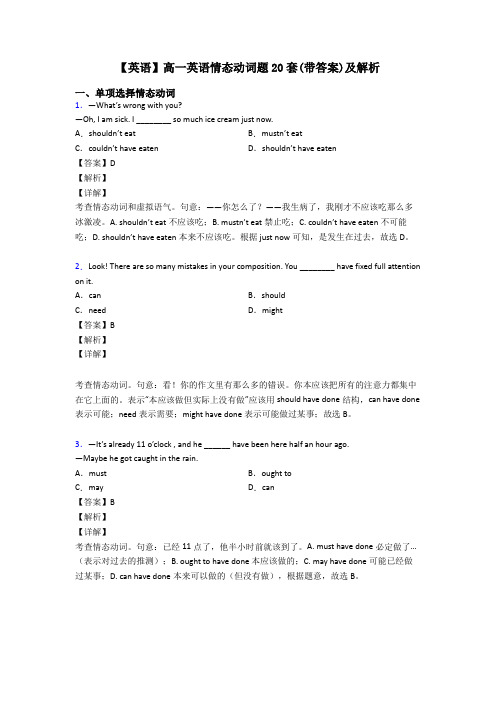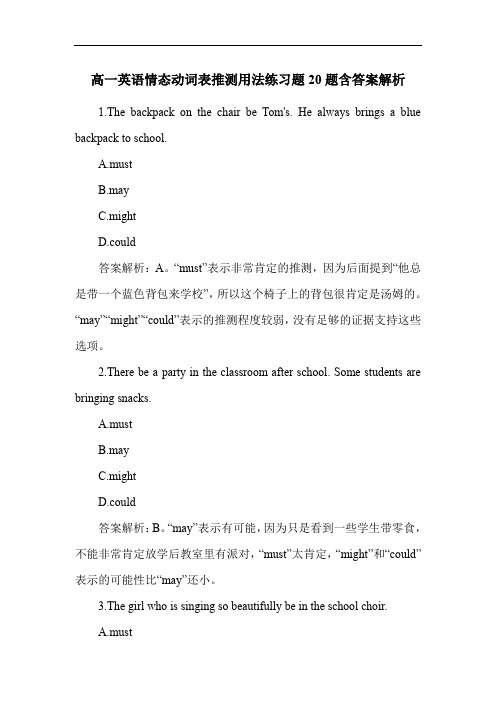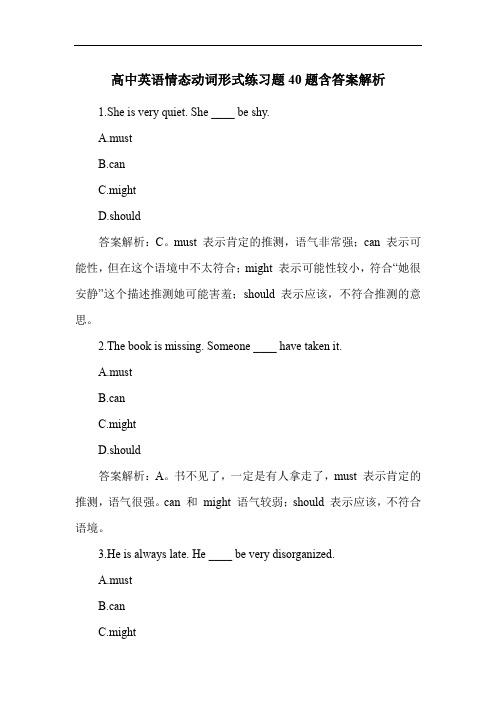高一英语情态动词专项训练及答案含解析
【英语】高一英语情态动词题20套(带答案)及解析

【英语】高一英语情态动词题20套(带答案)及解析一、单项选择情态动词1.—What’s wrong with you?—Oh, I am sick. I ________ so much ice cream just now.A.shouldn’t eat B.mustn’t eatC.couldn’t have eaten D.shouldn’t have eaten【答案】D【解析】【详解】考查情态动词和虚拟语气。
句意:——你怎么了?——我生病了,我刚才不应该吃那么多冰激凌。
A. s houldn’t eat不应该吃;B. mustn’t eat禁止吃;C. couldn’t have eaten不可能吃;D. shouldn’t have eaten本来不应该吃。
根据just now可知,是发生在过去,故选D。
2.Look! There are so many mistakes in your composition. You ________ have fixed full attention on it.A.can B.shouldC.need D.might【答案】B【解析】【详解】考查情态动词。
句意:看!你的作文里有那么多的错误。
你本应该把所有的注意力都集中在它上面的。
表示“本应该做但实际上没有做”应该用should have done结构,can have done 表示可能;need表示需要;might have done表示可能做过某事;故选B。
3.—It’s already 11 o’clock , and he ______ have been here half an hour ago.—Maybe he got caught in the rain.A.must B.ought toC.may D.can【答案】B【解析】【详解】考查情态动词。
句意:已经11点了,他半小时前就该到了。
高考英语情态动词练习题50题(答案解析)

高考英语情态动词练习题50题(答案解析)1.You be careful when crossing the road.A.mustB.canC.mayD.might答案解析:A。
“must”表示必须,过马路的时候必须小心,这是一种强烈的要求。
“can”表示能够,“may”表示可能,“might”表示可能性比“may”更小,这三个选项都不符合过马路要小心这个强烈的要求。
涉及的语法规则是“must”表示必须做某事。
2.She come to the party tonight,but I'm not sure.A.mayB.mustC.canD.will答案解析:A。
“may”表示可能,她今晚可能来参加派对,因为不确定。
“must”表示必须,语气太强烈;“can”表示能够;“will”表示将要,这三个选项都不符合不确定的语境。
涉及的语法规则是“may”表示可能性。
3.You finish your homework before you watch TV.A.mustB.canC.mayD.might答案解析:A。
“must”表示必须,先完成作业才能看电视,是一种规定。
“can”表示能够,“may”表示可能,“might”表示可能性比“may”更小,这三个选项都不符合规定的语境。
涉及的语法规则是“must”用于表示必须做某事。
4.He be very tired after a long day at work.A.mustB.canC.mayD.might答案解析:A。
工作了一整天后他肯定很累,“must”表示肯定的推测。
“can”表示能够,“may”表示可能,“might”表示可能性比“may”更小,这三个选项都不如“must”的推测强烈。
涉及的语法规则是“must”表示肯定的推测。
5.We take an umbrella.It might rain later.A.mustB.canC.mayD.should答案解析:D。
高一英语情态动词表推测用法练习题20题含答案解析

高一英语情态动词表推测用法练习题20题含答案解析1.The backpack on the chair be Tom's. He always brings a blue backpack to school.A.mustB.mayC.mightD.could答案解析:A。
“must”表示非常肯定的推测,因为后面提到“他总是带一个蓝色背包来学校”,所以这个椅子上的背包很肯定是汤姆的。
“may”“might”“could”表示的推测程度较弱,没有足够的证据支持这些选项。
2.There be a party in the classroom after school. Some students are bringing snacks.A.mustB.mayC.mightD.could答案解析:B。
“may”表示有可能,因为只是看到一些学生带零食,不能非常肯定放学后教室里有派对,“must”太肯定,“might”和“could”表示的可能性比“may”还小。
3.The girl who is singing so beautifully be in the school choir.A.mustB.mayC.mightD.could答案解析:A。
唱歌非常好听的女孩很有可能在学校合唱团,“must”表示很肯定的推测,这里有足够的理由认为她在合唱团,“may”“might”“could”可能性较小。
4.There be a basketball game on the playground this afternoon. I heard some boys talking about it.A.mustB.mayC.mightD.could答案解析:B。
只是听到一些男孩谈论,不能确定下午操场上一定有篮球比赛,“may”表示有可能,“must”太肯定,“might”和“could”可能性更小。
5.The book on the desk be Lisa's. She was reading it yesterday.A.mustB.mayC.mightD.could答案解析:A。
高中英语情态动词形式练习题40题含答案解析

高中英语情态动词形式练习题40题含答案解析1.She is very quiet. She ____ be shy.A.mustB.canC.mightD.should答案解析:C。
must 表示肯定的推测,语气非常强;can 表示可能性,但在这个语境中不太符合;might 表示可能性较小,符合“她很安静”这个描述推测她可能害羞;should 表示应该,不符合推测的意思。
2.The book is missing. Someone ____ have taken it.A.mustB.canC.mightD.should答案解析:A。
书不见了,一定是有人拿走了,must 表示肯定的推测,语气很强。
can 和might 语气较弱;should 表示应该,不符合语境。
3.He is always late. He ____ be very disorganized.A.mustB.canC.might答案解析:A。
他总是迟到,肯定是非常没有条理,must 表示肯定的推测,语气强。
can 和might 可能性较小;should 表示应该,不合适。
4.The lights are on. Someone ____ be at home.A.mustB.canC.mightD.should答案解析:A。
灯亮着,肯定有人在家,must 表示肯定的推测,语气强。
can 和might 可能性较小;should 表示应该,不符合语境。
5.The test was very difficult. She ____ have passed it.A.mustB.canC.mightD.should答案解析:C。
考试很难,她可能通过了,might 表示可能性较小。
must 语气太强;can 表示可能性,但不太符合这个语境;should 表示应该,不符合推测的意思。
6.He looks very tired. He ____ have worked hard.A.mustB.canD.should答案解析:A。
高一英语情态动词试题答案及解析

高一英语情态动词试题答案及解析1. Look ! There are so many mistakes in your composition . You ____ have paid attention to it. A.may B.must C.can D.should【答案】D【解析】句意:看!你的作文里有那么多的错误。
你本应该把所有的注意力都集中在它上面的。
表示“本应该做但实际上没有做”应该用 should have done 结构,故选 D。
考点: 考查情态动词2.—I saw Nancy on the way home yesterday.—It be her. She’s gone to the USA for further study.A.mustn’t B.can’tC.won’t D.needn’t【答案】B【解析】试题分析:句意:--昨天在回家的路上我看到南希了。
--那不可能是她。
她去美国学习深造了。
A禁止;B不能,不可能;C不会;D不需要。
根据后句内容判断说话人认为这是不可能的,选B。
【考点】考查情态动词3.— Mum, would you please buy me an ipad?— If you can help do the dishes the whole vacation, you ______ have one as a reward. A.would B.shallC.may D.must【答案】B【解析】考查情态动词。
shall 常用于第二、三人称主语后面表示说话人的意图。
句意:——妈妈,给我买个ipad好吗?——如果你能够在整个假期中帮助我刷盘子的话,你就会得到一个作为回报。
故B正确。
【考点】考查情态动词4. You __________be tired—you’ve only been working for an hour.A.must not B.won’t C.can’t D.may not【答案】C【解析】考查情态动词。
【英语】高一英语情态动词专题训练答案及解析

【英语】高一英语神态动词专题训练答案及分析一、单项选择神态动词1.AI will surely be a feature of future life, but it _____ be used responsibly and in a proper way. A. can B. need C. must D. will【答案】C【分析】【详解】观察神态动词。
句意:人工智能必定会成为未来生活的一个特点,但一定以负责任的方式和适合的方式使用它。
A. can 能够; B. need 需要; C. must 一定; D. will 将会。
此处为神态动词的一般用法,联合句意表示“一定”,应选 C。
2.It_____ have been Tom that parked the car here, as he is the only one with a car.A. may B. can C. must D. should【答案】 C【分析】【详解】观察神态动词表猜想的用法。
句意:必定是汤姆把车停在这儿的,由于他是独一有车的人。
A. may 可能; B. can 可能; C. must 必定; D. should 应当。
由as he is the only one with a car.可知必定是他把车停在这里的,特别有掌握的必定推测,应选C。
3.No student ________ go out of school to have lunch without permission of the headteacher. A. might B.mustC. shall D. could【答案】C【分析】【详解】观察神态动词。
句意:未经校长同意,任何学生不得走开学校去吃午餐。
might可能;must 必定,一定; shall 会,将; could 能够。
本句是一条禁令。
是第一、三人称时,表示许诺,警示,劝说等语气。
英语情态动词专项练习(含答案和解析)含答案
英语情态动词专项练习(含答案和解析)含答案一、选择题1.Exercise is helpful but it ________ be regular (规律的) exercise.A.must B.may C.can D.need2.To my joy, we_________ go to the bank. Mary has lent us some money.A.shouldn’t B.needn’t C.couldn’t D.wouldn’t 3.—Could you tell me how to renew the library books?—With pleasure. You ________ come to our desk every time. It’s easier to renew them online. A.can’t B.mustn’t C.needn’t D.shouldn’t 4.— What do you think of the show yesterday?— Some of them were really good but others ________ be better.A.will B.must C.need D.can 5.—Who’s the man over there? Is that Mr. Black?—It ________ be him. Mr. Black is much taller than that man.A.may B.must C.can’t D.mustn’t6.—I don’t care what people think.—Well, you _______ . Some opinions are worth weighing.A.should B.might C.could D.would7.You ________ drive after drinking alcohol(酒). It’s against the law.A.mustn’t B.needn’t C.couldn’t D.wouldn’t 8.We teenagers ________ have dreams. With dreams and hard work, anything amazing________ be created.A.may; can B.might; should C.should; can D.must; has to 9.You ________ be careful with the camera. It costs!A.can B.will C.should D.may 10.—The high school entrance examination is coming!— Yes, our teacher tells us we ________ be too careful while taking exams.A.mustn’t B.shouldn’t C.needn’t D.can’t 11.—Will my car be ready by the end of the day?—It ________ be, sir. I’ll call if there’s any problem.A.must B.could C.shall D.should 12.Mr. Black ________ be at home now. He went abroad on vacation last Friday. A.can’t B.mustn’t C.needn’t D.shouldn’t 13.— Is Lang Lang going to perform at Art Center this Friday?— Yes. It ________ be him. He has been here for three days.A.might B.must C.mustn’t D.may 14.You’ve got an A in the maths test again. You ________ be good at it.A.can B.may C.must D.should 15.You ________ write the report again because spelling mistakes are not allowed at all. A.must B.can C.may D.could16.—Where is Tom? I am considering ________ him about the result of the exam.—Oh. You ________. He has known it already.A.to tell; can't B.telling; needn't C.tell; mustn't D.told; shouldn't 17.— Mom, must I clean my room now?— No, you ________. You can do it after dinner.A.needn’t B.mustn’t C.shouldn’t D.can’t18.It’s amazing that the pen ________turn voice into text with few mistakes.A.can B.must C.may D.need19.—The high school entrance examination is coming!—Yes, our teacher tells us we _______ be too careful while taking exams.A.mustn't B.shouldn't C.needn't D.can't20.---Will you be back early this evening?---Yes, but I ________ be a little late. Our boss sometimes has extra work for us.A.may B.must C.need D.will21.We’ve discussed every detail of this plan and have got everything ready. But still something __________ go wrong. We still have to be very careful.A.must B.should C.would D.may 22.—Amy, I hear you've got many foreign coins._______ I have a look?—Of course, I'll fetch them for you.A.May B.MustC.Should D.Need23.—Will your mother be at home this Saturday?—Hard to say. She _______go to the countryside to see my grandparents.A.must B.may C.can D.would 24.Don’t cross the road until the traffic lights turn green. A car_______hit you.A.need B.may C.should D.must25.We shouldn’t throw any objects from the building. Even a small object ________ cause serious injuries or death, when dropped from a great height.A.must B.should C.may D.need26.Never throw objects from the building. Even a small object ________ cause serious injuries, or death, when dropped from a great height.A.must B.should C.may D.need27.Hurry up, or we ________ miss the beginning of the film.A.should B.must C.may D.have to28.You ________ require others to do with the problem like you. Everyone has his own way. A.mustn’t B.needn’t C.may not D.shouldn’t29.—I must go to school today, ________?—No, you ________.You can go as soon as you get well.A.mustn’t I;needn’t B.needn’t I;needn’tC.mustn’t I;mustn’t D.needn’t I;mustn’t30.—How do you like my new dress?—Well, if I ________ say, it is not suitable for you.A.may B.must C.have to D.should31.— Excuse me, could you tell me where the Nanjing Brocade Museum is?—Go along this road for five minutes. You ________ miss it. It’s a huge building.A.mustn’t B.can’t C.needn’t D.shouldn’t 32.—Mum, why do I have to wear a mask before entering the supermarket?—For your health and safety, you ________ be too careful.A.shouldn’t B.can’t C.mustn’t D.needn’t 33.—What is that young lady’s job?—She ________ be a nurse, I’m not sure.A.must B.may C.need D.would34.You _________ smoke here! Look at the sign. It says "No smoking".A.needn't B.mustn't C.can D.may35.— Listen! Tom ________ be listening to the music while doing his homework.—Let’s go upstairs to remind him to turn it off.A.should B.could C.would D.must 36.—Must I finish all my homework today, Mum?—No, you ________, my dear. You can finish some tomorrow if you like.A.needn’t B.shouldn’t C.can’t D.mustn’t37.— The sandstorm in Beijing is so serious this year.— Yes, I wonder when we ________ worry about the air we breathe.A.can’t B.mustn’t C.needn’t D.shouldn’t 38.—Is that Mr Zhou?—It ________ be him. He has gone to Beijing.A.can B.may C.can’t D.shouldn’t39.To avoid ________, we’d better ________ the parents’ meeting online.A.gather; hold B.gathering; hold C.gather; holding D.to gather; to hold 40.Most young people like shopping online because they ________ spend much time going from shop to shop.A.needn’t B.can’t C.mustn’t D.shouldn’t 41.—In China, many parents complain that their children have to stay up late to do the homework.—Don’t worry. The government has realized the problem. I’m sure there ________ be good news soon.A.can B.should C.need D.must42.I think all the students love the weekends because, to them, they ________ get up early on Saturdays or Sundays.A.mustn’t B.don’t need C.needn’t D.can’t43.— Is the boy over there Tom? He often wears a jacket like that.— It _______ be him. He is absent from school today.A.needn’t B.shouldn’t C.mustn’t D.can’t44.When people are waiting at the zebra crossing, cars and buses ________ wait and let them go first.A.must B.may C.can D.need 45.—Shall I tell him the change of the time right now?—I’m afraid you ________, otherwise he will be late for the meeting.A.can B.may C.must D.need46.— Will da d arrive home at 6 o’clock to have dinner with us this evening?— I think he will, but he ________ not. Sometimes he works extra hours.A.can B.must C.need D.may 47.—Seventy dollars for such a dress! You ________ be joking!—I’m serious. It’s made of silk from Hangzhou.A.must B.need C.will D.can48.Look at the floor, Tom! ________ you watch TV while having a meal?A.Should B.Could C.Must D.May 49.Sometimes smiles ________ be false, hiding other feelings like anger, fear or worry. A.should B.would C.must D.can50.We've discussed every detail of this plan and have got everything ready. But still something ________ go wrong. We still have to be very careful.A.must B.should C.would D.may【参考答案】***试卷处理标记,请不要删除一、选择题1.A解析:A【详解】句意:锻炼是有帮助的但是它必须是有规律的锻炼。
高中英语情态动词专项练习200题(含答案)
高中情态动词专项练习200题Ⅰ.情态动词的特征:①本身有词义;②不能独立作谓语;③后接动词原形一起构成谓语;④不随人称和数的变化。
Ⅱ.情态动词各自的基本意义及用法:1.can 与could用法2.may与might用法3.must与have to用法4.need与dare用法5.should与ought to用法6.shall与will用法7.used to与would用法Ⅲ.情态动词表推测:1.大多数情态动词(除表‘能力、许可、意志’外),都可以表示推测,其程度有差异。
按可能性程度的高低排列为:must﹥will ﹥would ﹥ought to ﹥should完全肯定完全可能很可能﹥can ﹥could﹥may ﹥might可能有可能2.区分情态动词的否定含义:may not或许不、可能不might not可能不can’t 不可能mustn’t不许、禁止shouldn’t不应该needn’t 不必3.情态动词表推测具体运用:情态动词可以对现在、进行、过去推测。
4.表示反劝的特殊的表推测形式5.注意:Ⅳ.情态动词表推测的反意疑问句1.情态动词表推测的反意疑问句,简单来说,就是以情态动词后的时态为淮,如句子里有明确的时间状语,则以其为准。
2.以must 为例:e.g.: 1.You must be hungry now, aren’t you?2.He must be watching TV , isn’t he ?3.Tom must have lived her for a long time, hasn’t he ?4.She must have arrived yesterday, didn’t she?注:如选择题中(以She must have arrived yesterday, didn’t she?为例)既有didn’t she又有hasn’t she 则以didn’t she?为最佳答案。
最新高一英语情态动词专项训练及答案
最新高一英语情态动词专项训练及答案一、单项选择情态动词1.Mark ______ have hurried. After driving at top speed, he arrived half an hour early. A.needn’t B.wouldn’t C.mustn’t D.couldn’t【答案】A【解析】考查情态动词。
need’t have done 本不必要做某事,句意:迈克本不必要着急的。
他以全速驾驶后,他早到了半个小时。
wouldn’t不会,mustn’t禁止,co uldn’t不可能,所以选A。
2.Look! There are so many mistakes in your composition. You ________ have fixed full attention on it.A.can B.shouldC.need D.might【答案】B【解析】【详解】考查情态动词。
句意:看!你的作文里有那么多的错误。
你本应该把所有的注意力都集中在它上面的。
表示“本应该做但实际上没有做”应该用should have done结构,can have done 表示可能;need表示需要;might have done表示可能做过某事;故选B。
3.—Did you attend the meeting for the experiment project yesterday?—Yes, but I don’t think I ____ because my director was there.A.need to have B.need to C.needed to D.need have【答案】D【解析】【分析】【详解】考查情态动词+have done。
句意:——你昨天参加实验项目的会议了吗?——是的,但我想我(本来)不需要,因为我的主管在那里。
Think/suppose等宾语从句中如果有否定词时,要把从句的否定词not前移,即“否定前移”。
高中英语情态动词形式练习题40题含答案解析
高中英语情态动词形式练习题40题含答案解析1.You come to the party tonight if you finish your homework.A.canB.couldC.mayD.might答案解析:A。
“can”表示有能力或有机会做某事,在这里表示如果你完成作业就有机会来参加今晚的派对。
“could”和“might”语气较委婉,“may”通常表示可能性。
在这个语境中,强调有能力和机会,用“can”最合适。
2.She pass the exam if she studies hard.A.canB.couldC.mayD.might答案解析:A。
同样,这里强调如果她努力学习就有能力通过考试,“can”表示能力。
“could”“might”语气委婉,“may”表示可能性,这里突出能力,所以选“can”。
3. you help me with this math problem?A.CanB.CouldC.May答案解析:B。
这里用“could”表示委婉地请求,“can”语气较直接,“may”和“might”在这个语境中不太符合请求的语气。
4.I ask you a question?A.CanB.CouldC.MayD.Might答案解析:C。
“may”用于请求许可比较正式,“can”也可以用于请求但相对不那么正式,“could”和“might”语气委婉但在这里不太符合直接请求的语境。
5. he come to school late today?A.CanB.CouldC.MayD.Might答案解析:D。
“might”在这里表示对可能性的较小推测,他今天有可能会迟到吗?“can”和“could”通常不用于这种较小可能性的推测,“may”也不太符合这个语境。
6. you lend me your pen?A.CanB.CouldD.Might答案解析:B。
“could”表示委婉地请求借笔,“can”语气较直接,“may”和“might”不太符合请求借东西的语境。
- 1、下载文档前请自行甄别文档内容的完整性,平台不提供额外的编辑、内容补充、找答案等附加服务。
- 2、"仅部分预览"的文档,不可在线预览部分如存在完整性等问题,可反馈申请退款(可完整预览的文档不适用该条件!)。
- 3、如文档侵犯您的权益,请联系客服反馈,我们会尽快为您处理(人工客服工作时间:9:00-18:30)。
高一英语情态动词专项训练及答案含解析一、单项选择情态动词1.One of our rules is that every student _______ wear school uniform while at school. A.might B.couldC.shall D.will【答案】C【解析】【详解】考查情态动词辨析。
句意:我们其中一条规则要求每个学生在校期间都要穿校服。
shall可以表示“命令,警告,强制要求;允诺;法律,规定要做……”,结合句意可知C正确。
2.—What does the sign over there read?—“No person___smoke or carry a lighted cigarette,cigar or pipe in this area.”A.will B.mayC.shall D.must【答案】C【解析】【详解】考查情态动词辨析。
句意:---那边的牌子上写的是什么?---任何人不得在本地区吸烟或携带点燃的香烟、雪茄或烟斗。
A. will表示现在的意志、愿望等,意为要,希望; B. may表示许可,或用于请求许可,意为可,可以;C. shall在陈述句中用于第二人称或第三人称,表示说话者的意志、命令、约定、决心、警告、威胁、预言等,意为必须,应该,要,得,给; D. must意为必须, 要,应当。
分析句意可知,词句表示任何都不准在这个区域吸烟或携带点着的香烟、雪茄或烟斗。
故选C项。
3.It has been announced that all the students ________ put on masks before going to school in case they are infected with SARS virus.A.shall B.will C.need D.may【答案】A【解析】【详解】【详解】考查情态动词。
句意:所有学生们应在去学校之前带上口罩以防感染非典病毒,这已经被宣布。
shall用于第二、第三人称,表示说话人给对方命令、警告、允诺或威胁,故选A 项。
4.It ________ be the postman at the door. It's only six o'clock.A.mustn't B.can'tC.won't D.needn't【解析】D[考查虚拟语气。
句意:不可能是邮递员在门口,才六点钟呢。
mustn't 禁止,不允许;can't 不可能;won't 不愿意,就是不,偏不;needn't 不需要。
]5.I love the weekend, because I ________ get up early on Saturdays and Sundays. A.mustn’t B.needn’tC.wouldn’t D.shouldn’t【答案】B【解析】【详解】考查情态动词。
句意:我喜欢周末,因为周六周日不必早起。
A. mustn’t不能,禁止;B. needn’t不必;C. wouldn’t不会;D. shouldn’t不应该。
此处表示“不必”,故B项正确。
6.No student ________ go out of school to have lunch without permission of the headteacher. A.might B.mustC.shall D.could【答案】C【解析】【详解】考查情态动词。
句意:未经校长允许,任何学生不得离开学校去吃午饭。
might可能;must一定,必须;shall会,将;could能够。
本句是一条禁令。
shall用于肯定句并且主语是第一、三人称时,表示允诺,警告,劝告等语气。
故选C。
7.The professor warned the students that on no account ________ use mobile phones in his class.A.should they B.they shouldC.dare they D.they dare【答案】A【解析】【详解】考查部分倒装和情态动词。
句意:这位教授警告学生们,在他的课堂上,决不应该使用手机。
on no account意为“决不”,否定词放在句首,句子使用部分倒装,排除B、D项;这里表示应该,故选A。
8.I still find it hard to imagine that such a clever child __________ make such a foolish mistake. A.shall B.mustC.can D.should【答案】D【详解】考查情态动词。
句意:我仍然难以想象这样聪明的孩子竟然犯这样愚蠢的错误。
should 作为情态动词,可以用来表示意外、惊喜或者在说话人看来是不可思议的,常常译为"竟会"、"居然",这么聪明的孩子竟然犯这样愚蠢的错误。
表示意外,shall表示允诺,命令等,must表示必须,can表示能力及可能性。
所以答案选D。
9.— Mum, little Ray broke his toys again!—It doesn't matter. You see, accidents _____happen.A.shall B.should C.must D.will【答案】D【解析】【详解】考查情态动词辨析。
句意:——妈妈,小雷又弄坏了他的玩具。
——没事的,你看,意外总会发生。
A. shall将要,会;B. should应当;C. must必须;D. will总是。
Will可以表示习惯,意思为“惯于,总是”。
故D选项正确。
【点睛】will/would是情态动词,其表达的意思如下。
(1)表示意志或意愿:决心,愿意,……好吗?We will do our best to save the child. 我们会尽力抢救这个孩子。
I told her to st op crying, but she just wouldn’t listen. 我叫她别哭,可她就是不愿听。
注:表示请求、建议或征求对方意见时,用Would you…? 比用Will you…?更婉转。
如:Will/Would you please keep the door open? 请让门开着好吗?Will/Would you go with me? 你愿意和我一起去吗?(2)表示真理或习惯:惯于,总是。
如:Oil will float on water. 油总是浮在水面上。
She will listen to music alone in her room for hours. 她独自在房间里听音乐,一听往往就是几小时。
He would get up early when he lived in the country. 他住在乡下时总是早起。
(3)表示要求:一定,必须。
如:You will report to me afterward. 你稍后一定要向我报告。
(4)表示猜测:可能,大概。
如:This will be the house you’re looking for. 这大概就是你找的那所房子了。
(5)表示功能:能。
如:This auditorium will/would seat one thousand people. 这个礼堂能容纳一千人分析句子可知,本句中的will表示习惯,意思为“惯于,总是”且符合语境。
故D选项正确。
10.The weather turned out to be fine. I _____________ the trouble to carry the umbrella withme.A.should have taken B.must have takenC.couldn't have taken D.needn't have taken【答案】D【解析】【详解】考查情态动词 + have done。
句意:天气转晴了。
我本不必费心把伞带在身边。
A. should have taken本应该做某事,而实际上没做; B. must have taken对过去发生的事情的肯定猜测;C. couldn't have taken不可能;D. needn't have taken本来不需要,故选D。
11.It has been announced that all the candidates ___________ remain in their seats until all the papers have been collected.A.shall B.couldC.would D.ought【答案】A【解析】【详解】考查情态动词用法。
句意:据宣布,所有的候选人都要坐在位置上,直到所有的试卷都被收齐。
根据句意可知本句是考试规则,情态动词shall可以表示“按照规则/规定/法律要做的事情”,符合本句语境。
故A项正确。
12.Ann said whenever her father was unhappy he ________ go out and buy something, usually something large and useless.A.should B.couldC.would D.might【答案】C【解析】【详解】考查情态动词。
句意:安说无论什么时候她父亲不高兴的时候,他就会出去买些东西,通常是一些又大又没用的东西。
A. should应该;B. could能;C. would总是,愿意;D. might 可能。
此处表示过去经常习惯做某事,故选C。
13.—I have something important to tell John. But I can’t find him.—His cell phone is here, so he ________ have gone too far.A.mustn’t B.needn’tC.wouldn’t D.can’t【答案】D【解析】【详解】考查情态动词。
句意:——我有重要的事情要告诉John,但是我找不到他。
——他的手机在这儿,所以他不可能走得太远。
根据句意可知,此处是对过去的一种猜测,此处是表达不可能……,用can’t have done。
故选D。
14.Most of the top leaders expressed a common desire at the UN conference, ______ that different cultures ______ coexist with tolerance.A.the one ; must B.the one ; should C.one ; must D.one ; should【答案】D【解析】【详解】考查替代和情态动词。
